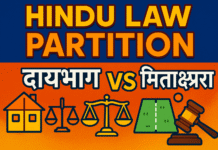What is the right of pre-emption with regard to the Hindu Succession Act ? Explain fully.
Ans. Right of pre-emption under Hindu Succession Act.—Section 22 of the Act embodies a law which is more or less analogous to the law ofpre-emption as it is understood under the Mohammedan Law IKesar v. Nanak, AIR 1958 Punj. 441. It confers upon the heirs of class I of the Schedule a preferential right to acquire an interest which any other heir of the same class may be contemplating to transfer to an outsider. The well-known right of pre-emption with regard to sales has been extended in its scope to all kinds of transfers including sales, mortgages, gifts and leases, etc. It has been further extended by including immovable property along with business. The provisions known as ‘right of pre-emption’ is as follows—Where after the commencement of this Act an interest in—(1) any immovable property; or (2) In any business carried on by him whether solely or in conjunction with others—(a) devolves upon two or more heirs specified in class I of the Schedule; and (b) any one of such heirs proposes to transfer his or her interest in the property or business the other heirs shall have preferential right to acquire the interest proposed to be transferred. The consideration for which any interest in the property of the deceased may be transferred in the absence of any agreement between the parties be determined by the court on application made for the purpose and if any person proposing to acquire the interest is not willing to acquire it for the consideration so determined by the Court, such person shall be liable to pay all costs incidental to the application. In a case of two or more heirs specified in class I of the Schedule proposing to acquire any interest under the above rule, that heir who offers highest consideration for the transfer shall be preferred. In Nagammal v. Nanjammal 1(1970) ML. .3581, Mr. Justice Natesan said that Section 22 embodies two-fol J aspect of right of pre-emption viz. (1) the primary and substantive right to have an offer made; and (2) the secondary or remedial right of the co-heirs,if property is sold without being first offered to him, to take it from the purchaser. This right is personal and not attached ID. P Setty is Gyanachandra ppa, AIR 1972 MYS. 871.






![Maneka Gandhi v. Union of India [1978] 2 SCR 621: A Watershed Moment in Indian Constitutional Jurisprudence](https://www.infipark.com/articles/wp-content/uploads/2026/02/Image-Feb-18-2026-10_47_59-AM-218x150.jpg)







